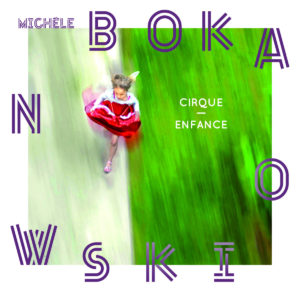 Michèle Bokanowski’s Enfance is already seven years old. I was at its premiere, which was grand, and am only now getting to this review, which is reprehensible. So first I have to apologize to Michèle and to the entire music-loving world. If you have already heard of this piece, great. If you have already heard it, even better. If not, here at long last is the review you didn’t even know you’d been waiting for, for a piece that you will shortly add to your growing list of favorites. For this is a rich and rewarding piece of music, cunningly made and a treat to listen to again and again.
Michèle Bokanowski’s Enfance is already seven years old. I was at its premiere, which was grand, and am only now getting to this review, which is reprehensible. So first I have to apologize to Michèle and to the entire music-loving world. If you have already heard of this piece, great. If you have already heard it, even better. If not, here at long last is the review you didn’t even know you’d been waiting for, for a piece that you will shortly add to your growing list of favorites. For this is a rich and rewarding piece of music, cunningly made and a treat to listen to again and again.
There are a lot of things I could say about this piece, about the deep drone and the smooth textures and the utterly charming voices of the two young children (Bilal and Suleyman Bokanowski) who provide the vocal sounds. I could talk about the narrative and musical logic of the piece, about the recurring piano tune and the various ways it’s broken up as it meanders through the piece. But what really struck me, listening to it many times to prepare for this review, is that this is a very deceptive piece. It is made up, for instance, of lots of various, different bits that are juxtaposed, but the smoothness of the drone, the slowness of the pace, and the general richness of all the sounds all serve to conceal this structural reality. It’s as if you were to sit in front of a dense forest scene in a museum only to gradually discover that you were actually looking at a cubist painting.
Also, even though the drone and the smooth, rich texture is prominent, and engaging, a close listen to this piece will, I believe, reveal that it’s a piece primarily about rhythm. I would say that the drones and the pace and the overall smoothness of texture are there primarily as a foil for a kaleidoscopic plethora of rhythms and counter rhythms—rhythmic counterpoint at times. And where the rhythms come from is interesting, too, a speech rhythm morphing into song and then made into a different rhythm by being made into a loop, or a single syllable extracted and used to punctuate the texture, or just normal speech, which in the context is impossible not to notice as being equally rhythmical to all the rest.
Which brings us back to that drone, which I have rather mis-reported—the drone is as full of rhythmical subtleties and complexities as all the rest. I could go on and on. Best to just leave you to the piece itself, forgetting everything I’ve said about it to enjoy just it, itself, first in this five minute clip and ultimately, it is to be hoped, in the piece as a whole. I can’t imagine you’ll regret buying this album. After all, on the very unlikely chance that you do not particularly like Enfance, you’ve got a whole ‘nother piece to enjoy, Cirque, a piece quite different from Enfance, and quite delightful all on its own.